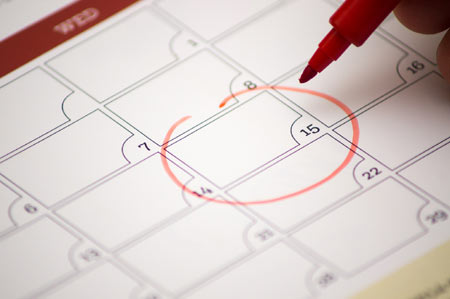 Updated 8-1-18. If a Notary Signing Agent encounters loan documents that are dated after the signing appointment, is it OK to notarize them? Sometimes, depending on the document and type of loan.
Updated 8-1-18. If a Notary Signing Agent encounters loan documents that are dated after the signing appointment, is it OK to notarize them? Sometimes, depending on the document and type of loan.
It is universally recognized that the date on a notarial certificate must be the day the notarization was performed. And home loan documents — for example, the deed of trust or mortgage — generally are dated before or on the same day as the notarization. But with certain types of home loans offered by certain lenders, it is a common — and acceptable — practice for documents to be dated after the notarization was performed.
HARP loans
Loan document packages circulating under the Home Affordable Refinance Program (HARP), for example, are often post-dated.
Generally, the “future” date appearing on the deed of trust or mortgage is near the end of the calendar month. This is because the lender chooses to fund all of its HARP loans in the month at one time. This is known as “bulk-funding.”
If you took a loan-signing assignment in the middle of November, for example, the documents might be dated November 30. This is okay as long as you follow two critical steps:
- You enter the actual date of the notarization on the certificate of acknowledgment, not the date appearing on page 1 of the mortgage or deed of trust.
- The borrower enters the actual date of signing on any documents requiring a date next to the signature.
If you are asked to notarize a deed of trust or mortgage for a HARP loan, the NNA recommends that you make a note of the date of the post-dated deed or mortgage in your Notary journal.
‘Table funding’
Some states allow a practice called “table funding.” This occurs when the loan is funded at a closing by an advance of the loan funds from the lender.
In these circumstances, the documents may be post-dated because they will be sent to the absent party to sign at a later date. When this happens, it’s also permitted to notarize the post-dated documents.
Post-dated documents may be notarized since the date in question appears in the text of the document. Notaries typically aren’t responsible for ensuring the accuracy of the document text. When reviewing documents, your only responsibility is to make sure the document is complete and does not have any blank spaces. You are not responsible for the contents of the document.
Additional Resources:
Minimize Your Liability
Brush Up On Your Skills With The Notary Essentials eLearning Course